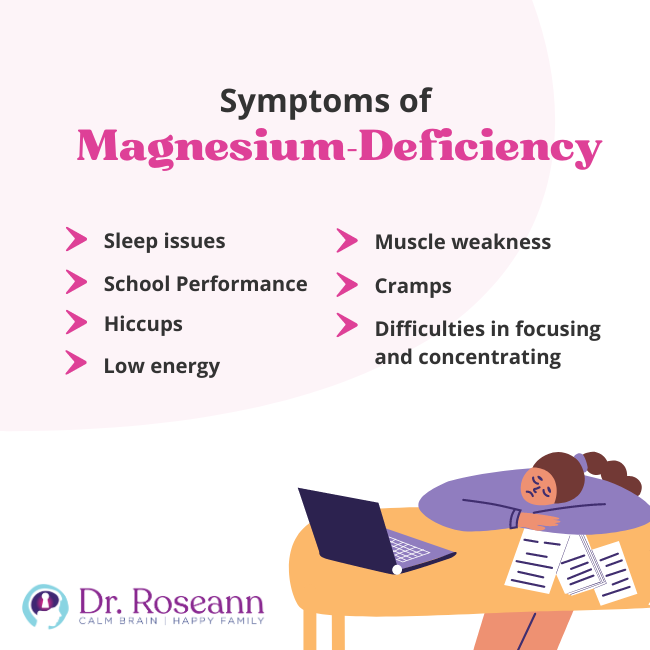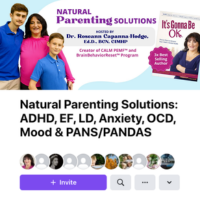The Power of Magnesium for Children's Mental Health and Behavior
Think of magnesium as a silent superhero that’s always working behind the scenes to keep your child's brain ticking along nicely. This incredible mineral has its hands in many of the brain's backstage operations, including making mood-regulating chemical messengers, known as neurotransmitters.
When the magnesium levels dip too low, it can mess up this backstage harmony, potentially leading to mental health and behavioral struggles like ADHD, depression, and anxiety in kids.
Table of Contents
Chapter 2: How is Magnesium Absorbed and Processed in the Body?
Chapter 3: Symptoms of Magnesium Deficiency
Chapter 4: How Low Magnesium Levels Impact Physical and Mental Health
Chapter 5: Magnesium for Children: Why Do Kids Need Magnesium?
Chapter 6: Magnesium Benefits for Children and Teens
Chapter 7: Physical, Mental Cognitive and Attentional Benefits of Magnesium for Kids
Chapter 8: Why is Magnesium Important for Children with Emotional and Behavioral Challenges?
Chapter 9: What Does the Research Say About Magnesium?
Chapter 10: Why is Magnesium Your Kid's Ally in Learning and Memory?
Chapter 11: How Can Magnesium Be Your Child's Shield Against Stress and Anxiety?
Chapter 12: Magnesium and Sleep: Can Magnesium Tuck Your Child in for a Good Night's Rest?
Chapter 13: How Does Magnesium Help with Kids Calm and Self-Regulation?
Chapter 14: How Can Magnesium Offer a Helping Hand to Special Needs Children?
Chapter 15: Magnesium and ADHD
Chapter 16: Magnesium and Autism
Chapter 17: Magnesium Benefits for Women: How Every Mom Needs to Share Their Calm
Chapter 18: Best Sources of Magnesium for Kids
Chapter 19: When is Magnesium Supplementation Necessary?
Chapter 20: Sprinkling Magnesium Rich Foods into Your Child's Meals
Chapter 21: The Challenge of Nourishing Kids in a Fast-Food World
Chapter 22: Exploring Magnesium Supplements for Your Children and Teens
Chapter 23: Magnesium Dosage: How Much Magnesium Should I Take a Day?
Chapter 24: Is 500mg of Magnesium Too Much?
Chapter 25: When to Take Magnesium Supplements
Chapter 26: Can I Take Magnesium with Other Supplements
Chapter 27: How to Get Kids Take Magnesium Supplements
Chapter 28: Potential Magnesium Supplement Side Effects
Recently, magnesium has been stepping into the spotlight, catching the attention of parents everywhere. Why? Because research is hinting that magnesium might help soothe symptoms tied to mental health and behavioral issues in children. It seems it might help to turn down the volume on anxiety, depression, and ADHD, and could even help improve how well your kiddo sleeps and manages their aggression.
Children, with their rapid growth spurts, actually need more magnesium than adults. This power-packed mineral is not just crucial for their brain and behavior, but also for their nervous system, muscles, immunity, heart health, and strong bones.

However, in this age of convenience foods, magnesium is often left off the menu. It can be hard to convince your kids to eat more wholesome foods, especially with so many processed food options available. A good strategy could be to get them used to magnesium-rich foods early on, or consider introducing magnesium supplements. By doing so, you're setting them up for lifelong healthy eating habits.
According to a study by DiNicolantonio et al. (2018), about 20% of people, children included, don't have enough magnesium in their system. This deficiency can lead to a host of behavioral and mental health issues, including depression and anxiety.
Knowing this, it's vital for parents to be on the lookout for the link between low magnesium levels and mental health issues. By taking steps to ensure your child gets enough magnesium, you'll be helping to armor them against these potential health challenges without the harmful side effects of medication.
Chapter 1:
What is Magnesium?
Think of magnesium as your child's body's best friend. This friendly nutrient gives a boost to their muscles and nerves, helps control their blood sugar and blood pressure, and lends a hand in building proteins, bones, and DNA. It's also a big supporter of your child's brain health and could even help manage some mental issues or brain conditions.
Magnesium has a key role in how your child's brain plays ‘telephone.' It helps calm their nervous system by quieting those ‘loud' signals in the brain that can make them feel overly excited or anxious. Plus, it's like a friendly mediator, helping brain cells communicate better.
Many parents think of magnesium as a natural chill pill because it's involved in over 300 systems that control different chemical reactions in the body. Giving your child a magnesium supplement can help soothe their nervous system, battle stress, and keep their body functions running smoothly.
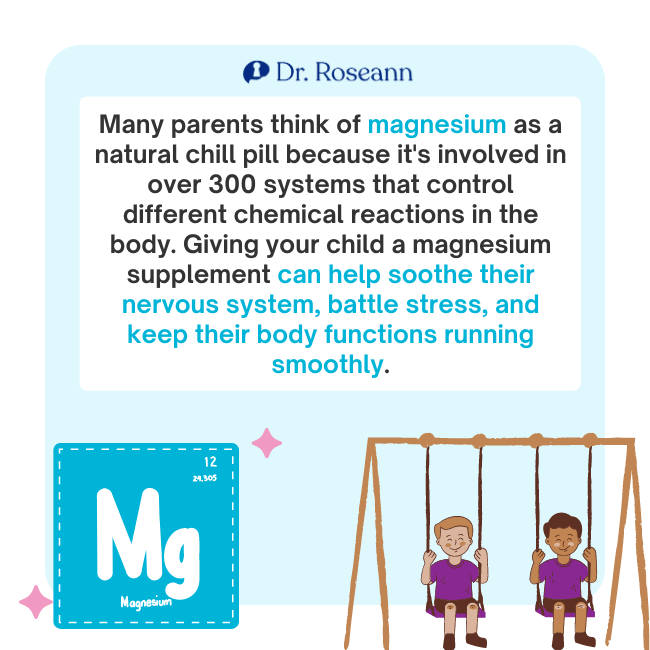
Chapter 2:
How is Magnesium Absorbed and Processed in the Body?
Now, let's talk about how magnesium goes from the dinner plate to being absorbed and used in the body.
Magnesium is a team player in your child's body, working closely with their gut, bones, and kidneys to maintain a healthy balance. When your child eats magnesium-rich food, some of it gets absorbed in the gut and then goes off to a storage party in the bones. The leftovers get escorted out of the body by the kidneys.
After being absorbed in the small intestine, magnesium hops a ride to the liver, where it's stored until it's time to be released into the bloodstream for its big job in the body. Estrogen also has a key role in this journey, helping more magnesium get absorbed in the intestines and less to be eliminated in the kidneys, keeping our magnesium levels steady and preventing any deficiencies in this essential mineral.
Chapter 3:
Symptoms of Magnesium Deficiency
Imagine magnesium as a little helper, always buzzing around behind the scenes in your child's body to keep things running smoothly. But what happens when this helper is not around as much? It turns out that low levels of magnesium can lead to a variety of health concerns.
Some of the most common symptoms of low magnesium levels include:

- Muscle cramps and weakness (Gröber et al., 2015)
- Fatigue and weakness (Veronese et al., 2016)
- Osteoporosis and bone health issues (Castiglioni et al., 2013)
- Hypertension and cardiovascular disease (Rosanoff et al., 2012)
- Asthma and respiratory issues (Gontijo-Amaral et al., 2015)
- Metabolic syndrome and diabetes (Guerrero-Romero & Rodríguez-Morán, 2011)
- Hormonal imbalances (Maggio & Ceda, 2011)
- Migraines and headaches (Sun-Edelstein & Mauskop, 2009)
- Insomnia and sleep disturbances (Abbasi et al., 2012)
- Anxiety and stress-related disorders (Boyle et al., 2017)
- Depression and mood disorders (Tarleton et al., 2017)
- Cognitive decline and memory impairment (Kieboom et al., 2018)
- Impaired cognitive function and memory (Eby & Eby, 2010)
- Increased risk of anxiety and depression (Jacka et al., 2009)
- Irritability and mood swings (Barragán-Rodríguez et al., 2017)
- Restlessness and hyperactivity (Starobrat-Hermelin & Kozielec, 1997)
- Difficulty concentrating and maintaining attention (Tarleton et al., 2018)
- Insomnia and sleep disturbances (Abbasi et al., 2012)
- Increased risk of neurological disorders, such as Parkinson's disease (Barańska-Gieruszczak & Kucharska, 2014)
Chapter 4:
How Low Magnesium Levels Impact Physical and Mental Health
What unfolds when your kiddos aren't getting their fair share of magnesium? A magnesium deficiency in children is more common than you think. With today’s standard American Diet (SAD) and high stress levels, not meeting daily magnesium requirements is the norm. This shortfall can cause a whole host of problems, including feelings of constant tiredness, muscle weakness, and anxiety, not to mention bouts of depression and disturbed sleep.
In children, a lack of magnesium may also translate into mental health and behavioral issues, such as ADHD. It can also make them more likely to have bouts of irritability and quick tempers. But, fear not, because there's a silver lining. Upping their magnesium intake can bring about positive changes in their physical and mental well-being and help ease these troubling symptoms.
So, let's roll up our sleeves and dig in to learn more about the vital role magnesium plays in your child's health, and how you can ensure they're getting enough of this crucial mineral.
Keep in mind, while the symptoms of magnesium deficiency can vary among individuals, there are some common signs to keep an eye out for:
Symptoms of Magnesium Deficiency
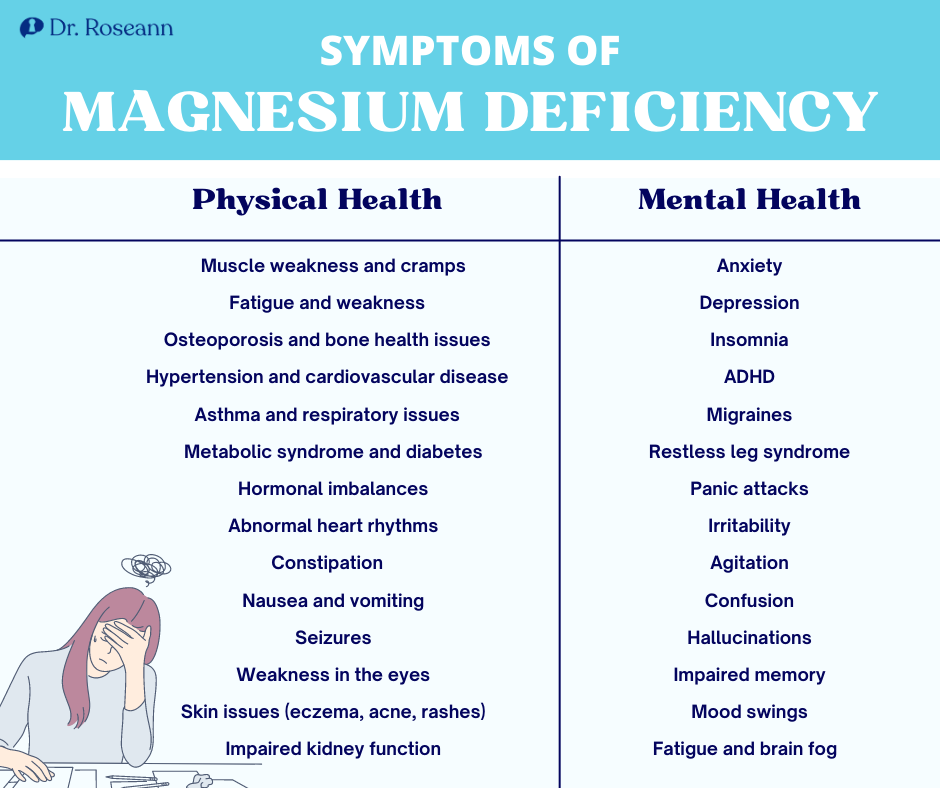
Chapter 5:
Magnesium for Children: Why Do Kids Need Magnesium?
Well, children, even little ones, need magnesium for a whole host of reasons. It's like a maestro conducting the orchestra of their bodies, directing enzyme activity, and overseeing the balance of calcium and potassium. It's also the backbone of healthy cells, nerve and muscle function. Plus, it's like a trusted guardian for your child's bones, making sure calcium gets absorbed and used just right.
Magnesium has its fingers in many pies within your child's body. It helps in absorbing nutrients, digesting food, powering up their immune system, forming DNA, promoting regular bathroom habits, keeping muscles and the nervous system active, balancing blood sugar, and looking after their bones and teeth. It's even got a role in helping them focus, and in keeping their moods on an even keel.
On the flip side, when magnesium takes a backseat, a lot of health problems can crop up. These might include hiccups in their growth and development, muscle weakness, tiredness, crankiness, and mood swings.
Children not getting enough magnesium-rich foods to fulfill their daily requirements might experience troubles like sleep issues, school performance hiccups, low energy, muscle weakness, cramps, and difficulties in focusing and concentrating.
Chapter 6:
Magnesium Benefits for Children and Teens
As parents, we want the best for our children's health and well-being. One essential nutrient that plays a crucial role in their growth and development is magnesium. This mineral is involved in numerous bodily functions and has a range of benefits for kids. From supporting their overall health to aiding in cognitive function, magnesium is a valuable natural stress reducer that isn't going to harm the brain like psychiatric medications can.
Some of the key benefits that magnesium offers to kids:
- Promotes healthy growth and development
- Supports strong bones and teeth
- Aids in proper muscle function and relaxation
- Enhances cognitive function, attention, and memory
- Helps regulate mood and emotions
- Supports a healthy immune system
- Assists in energy production and metabolism
- Promotes restful sleep
- Reduces symptoms of anxiety and stress
- Calms and regulates the brain
Incorporating magnesium-rich foods into your child's diet or considering magnesium supplementation can help ensure they receive adequate levels of this important mineral.
By prioritizing their magnesium intake, you're taking a proactive step towards supporting their overall health and well-being.

Chapter 7:
Physical, Mental Cognitive and Attentional Benefits of Magnesium for Kids
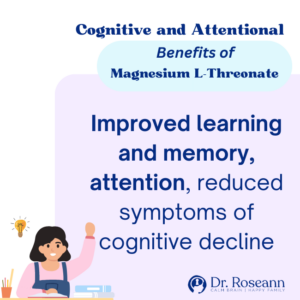
Imagine magnesium as a fitness coach for your child's body, helping to build strong muscles, support digestion, and maintain a regular heartbeat.
In the realm of mental wellbeing, it's akin to a soothing lullaby, easing anxiety, battling depression, and encouraging a good night's sleep.
On the cognitive front, think of magnesium as a brain-boosting tutor, aiding memory and learning while enhancing focus. It's also a trusty sidekick in managing attention, helping to keep ADHD symptoms at bay.
In short, magnesium is truly a powerful ally in supporting your child's overall health and wellbeing!
Physical, Mental Cognitive and Attentional Benefits of Magnesium
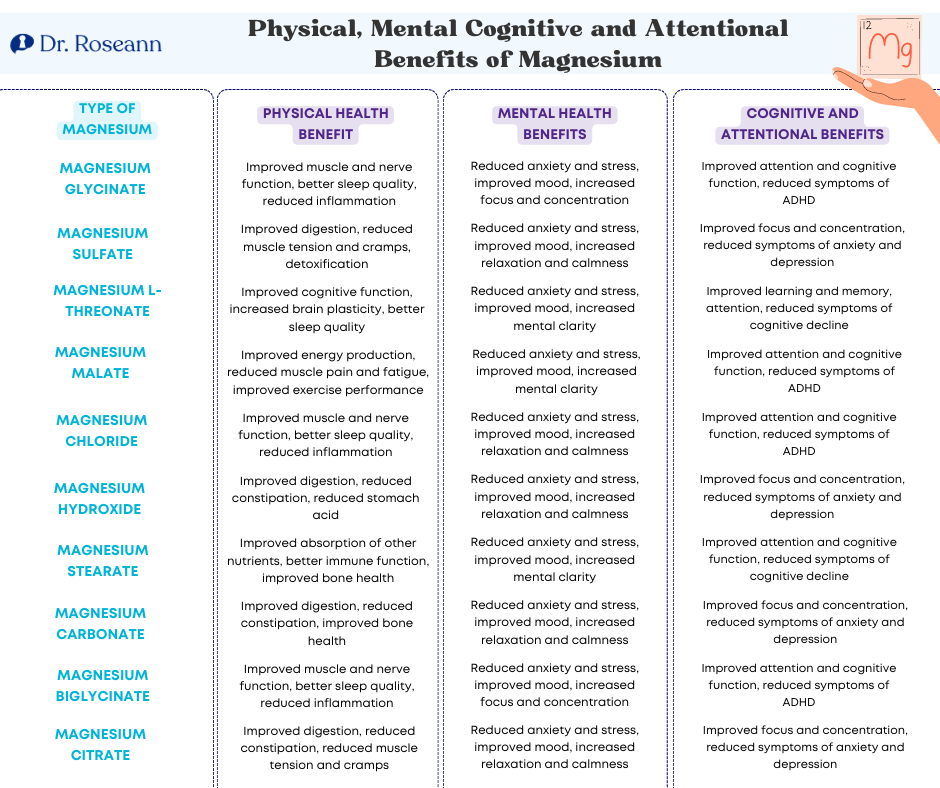
Chapter 8:
Why is Magnesium Important for Children with Emotional and Behavioral Challenges?
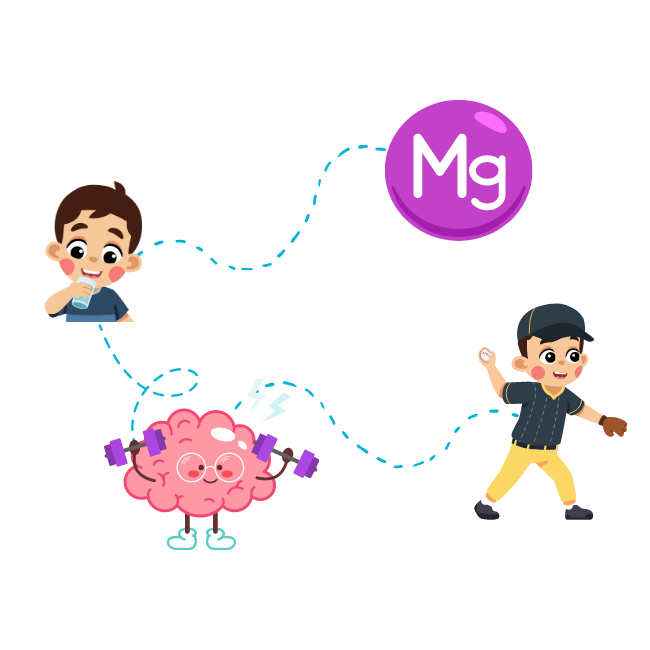
Ever noticed how a well-charged battery keeps your child's favorite toy running longer? Magnesium does the same for your child's brain. It helps to break down the ‘fuel' (glucose) that your child's brain needs to run efficiently. Without enough magnesium, this process might not go as smoothly, potentially leading to anxious behavior and difficulty in social situations.
We need magnesium for the nervous system to work properly and manage the stress response of the autonomic nervous system (ANS). And that isn’t just to manage big stressors like failing a test but the day to day stressors we all face.
Magnesium also has another superhero role. It helps build DNA, RNA, and a powerful antioxidant called glutathione, which is kind of like the brain's cleaning crew. It helps get rid of harmful substances, keeping the brain healthy.
Sometimes, when a child is feeling anxious, their brain might be experiencing something similar to a traffic jam, where there's too much ‘oxidative stress' and not enough ‘detoxification.' This is where magnesium, our trusty traffic controller, steps in again. It can help reduce anxiety by controlling this brain traffic better.
Furthermore, it can be a calming soother for your child's brain, regulating it and helping manage symptoms associated with conditions like obsessive-compulsive disorder, mood swings, and attention-deficit hyperactivity disorder. And with so much an increase in clinical mental health issues in children, we need natural mental health solutions that support the brain.
A lot of scientific research supports these benefits of magnesium. So, by ensuring your child gets enough of it, you're essentially giving their brain the tools it needs to work at its best, supporting their mental health and well-being.
Chapter 9:
What Does the Research Say About Magnesium?
Why should we listen to science when it comes to magnesium? Here's what the research has to say:
Maintaining adequate magnesium intake, whether through a balanced diet or supplements, is crucial for supporting brain and mental health. A comprehensive study found that adults who included more magnesium in their diet had a lower prevalence of both depression and anxiety (Keshteli et al., 2018).
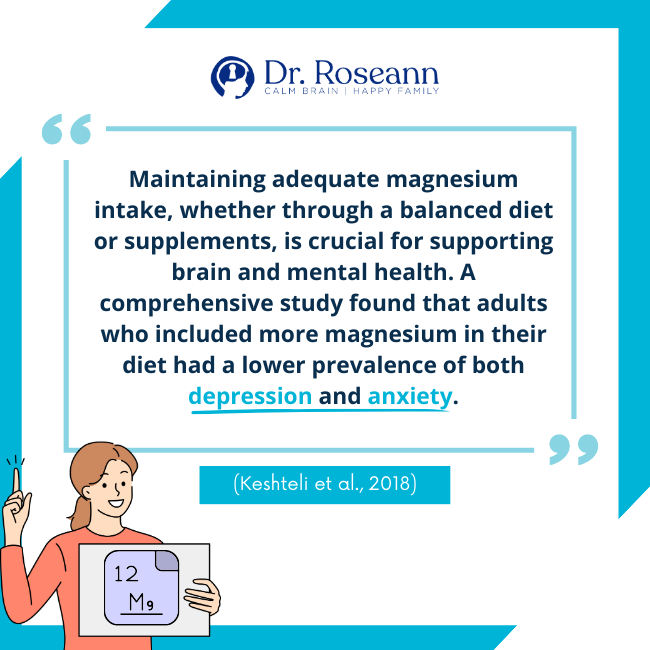
For children, having insufficient magnesium is linked with detached or unemotional behavior. Both magnesium and Vitamin B6 are key players in the brain's chemical processes that help regulate antisocial tendencies and lack of emotional expression (Portnoy, 2021).
When it comes to kids with ADHD, they are more likely to have magnesium deficiencies. According to a 2016 study, a staggering 72% of children with ADHD had low magnesium levels. This deficiency seems to be connected with typical ADHD behaviors such as lack of attention, feeding issues, and a poor diet, possibly exacerbated by the side effects of psychostimulant medications (Journal of Medical Human Genetics, 2016).
The research is consistent in showing that having enough magnesium in the body correlates with lower anxiety, depression, and ADHD symptoms. On the flip side, low magnesium levels are associated with increased disruptive behaviors, while higher magnesium levels seem to dial down such behaviors (Black et al., 2015).
Combining magnesium with vitamin B6 has been found to help soothe the central nervous system and lessen hyperactive behaviors such as physical aggression, restlessness, and muscle spasms (Mousain-Bosc, 2004). In fact, taking a daily dose of 100mg of magnesium and vitamin B6 for a period of 3 to 24 weeks can help restore normal levels and reduce disruptive behaviors.
Chapter 10:
Why is Magnesium Your Kid's Ally in Learning and Memory?
Think of your child's ability to learn and memorize information as a superpower, necessary for their brain's growth. Now, imagine that everything from their snack habits to their play environment influences this superpower.

Fascinatingly, a study by Slutsky et al. (2010) noted that when they gave rats a magnesium boost, the furry subjects improved their learning skills, working memory, and both short-term and long-term memory. This improvement wasn't just for the young ones; even the older rats became better at completing patterns.
Looking into the brains of these rats, the scientists found that the ones given a magnesium snack had an increase in tiny spots in their hippocampus – the “remember-it-all” headquarters in the brain. These spots seemed to give the rats a better memory recall.
The study further revealed that magnesium helped the rat brains respond better to sudden changes, like the startling sound of a bell, while ensuring that unnecessary brain messages were kept on mute.
Another fascinating discovery was that magnesium aids in the smooth chit-chat happening between nerve cells, a process linked to an increase in the number of brain cell receptors that help in learning and remembering. These findings suggest that perhaps, by packing a little more magnesium into your child's diet, they could become quicker at learning and recalling their ABCs and 123s.
Chapter 11:
How Can Magnesium Be Your Child's Shield Against Stress and Anxiety?
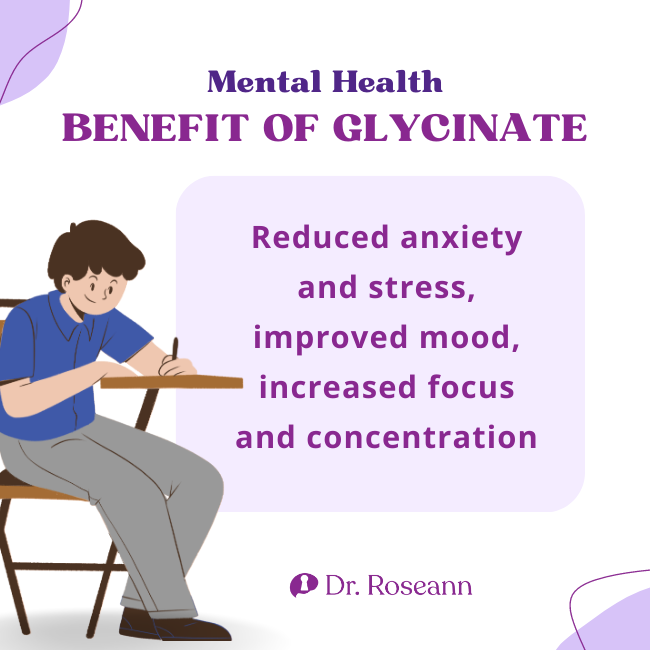
Life can sometimes be a merry-go-round of stress and magnesium deficiency, two common problems that can invite physical health issues. Numerous studies have spotlighted magnesium's crucial role in managing the body's reaction to stress. It has also been observed that folks who are often stressed tend to have low levels of magnesium.
Here's the interesting part: stress can lead to a drop in magnesium levels, and being short on magnesium can make the body more vulnerable to stress – talk about a tricky cycle! But adding a magnesium supplement to your child's diet might be the superhero that breaks this cycle. Keep in mind that the symptoms of lacking magnesium often mimic those of stress, including feeling tired, irritable, and anxious (Pickering et al., 2020).
Chapter 12:
Magnesium and Sleep: Can Magnesium Tuck Your Child in for a Good Night's Rest?
Did you know that magnesium could be your little one's ticket to dreamland? It's like a gentle lullaby that promotes a peaceful sleep, thanks to its magic in aiding relaxation. As a busy bee in our bodies, magnesium helps regulate the signals that zip through our nervous system, the big boss controlling all physical and mental functions.

Think of these signals as little messages, called neurotransmitters, bustling along the nerve highways, ensuring our bodies run like well-oiled machines.
Now, where does magnesium fit in all this? It's like a traffic cop for these neurotransmitters. It puts a stop sign for the ones that rev up activity and boosts the ones that bring on calm vibes. This results in a zen-like relaxation state, perfect for a sound sleep.
One such calming neurotransmitter that magnesium interacts with is GABA, a natural resident of our brains. GABA, when it latches onto specific receptors, slows down the nerve signals, creating a wave of relaxation and a nudge towards sleep.
Chapter 13:
How Does Magnesium Help with Kids Calm and Self-Regulation?
All of our kids get dysregulated sometimes but dysregulated kids are more common due to the rise in neurodevelopmental and clinical issues. We need natural mental health solutions that can help the brain and body regulate.
Imagine magnesium as a peace-promoting diplomat, activating the body's chill-out zone – the parasympathetic nervous system. This system ushers in a tranquil state, popularly known as the “relaxation response.”
The opposite of this calm is the adrenaline-pumping “fight or flight” response that dials up stress and arousal. But, the parasympathetic system swoops in to balance this out, steering the body back to a peaceful equilibrium or homeostasis.
Now, to attain this balance, the body needs a generous dose of magnesium, particularly after a bout of the “fight or flight” response. And for kiddos who find emotional self-control a tad challenging, a little extra magnesium could be just what the doctor ordered.
The concept of homeostasis is all about maintaining steady internal conditions, like temperature, water, and sugar levels, amidst any changes inside or outside the body. Emotional self-control hinges on this balance, which is where our friend magnesium steps in.
Research has shown that children with higher magnesium levels tend to exhibit improved self-regulation (Huss et al., 2017). By modulating neurotransmitters in the brain, such as GABA, magnesium creates a sense of relaxation and reduces anxiety. This helps our children better manage their emotions and impulses, leading to more effective self-regulation.
Chapter 14:
How Can Magnesium Offer a Helping Hand to Special Needs Children?
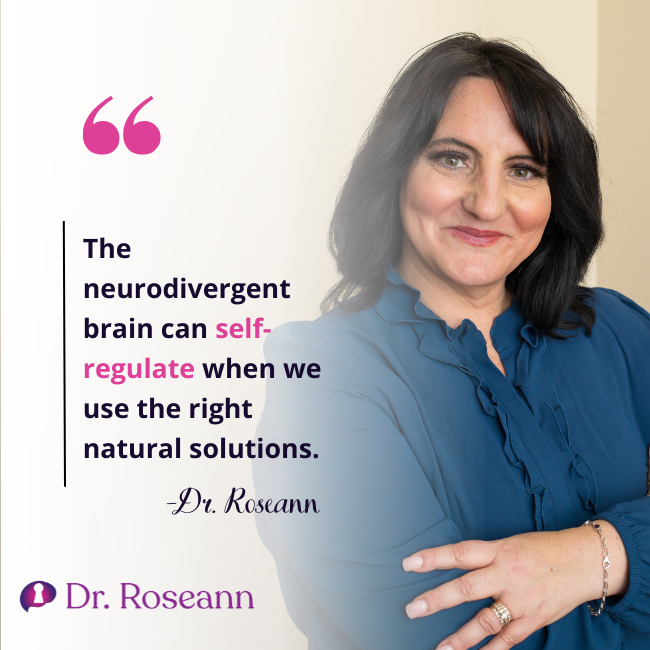
Magnesium is a VIP guest for brain health, and not having enough of it is a common issue in acute and chronic brain conditions. A shortfall in magnesium can unfortunately lead to brain cells bidding goodbye due to oxidative stress. Decreased brain magnesium levels have been associated with the onset of motor and cognitive challenges (Mousain-Bosc et al., 2011).
The neurodivergent brain can self-regulate when we use the right natural solutions. We want to do everything we can to avoid dangerous medications such as SSRI’s and the good news is that supplements such as magnesium can help lower stress levels and support mood.
Chapter 15:
Magnesium and ADHD
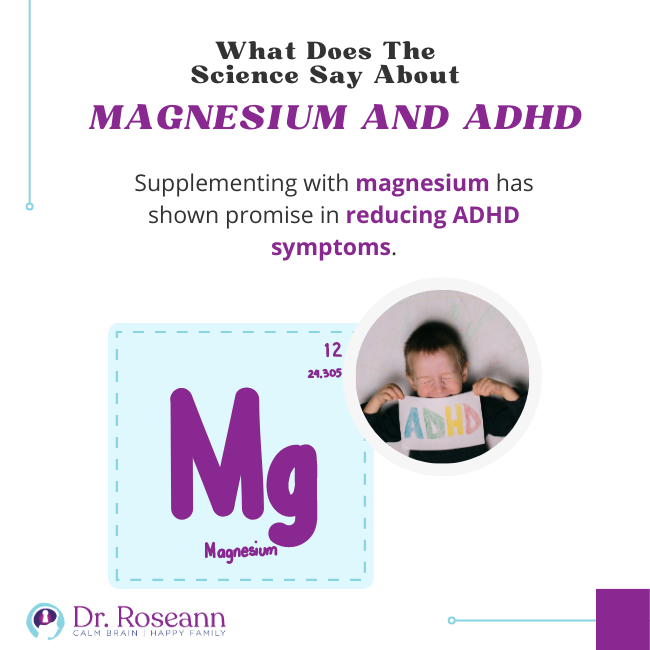
Supplementing with magnesium has shown promise in reducing ADHD symptoms. In fact, research has shown that magnesium supplementation can improve hyperactivity, impulsivity, and attention span in children with ADHD (Mousain-Bosc et al., 2006). By regulating neurotransmitters and promoting a calmer state of mind, magnesium may provide valuable support for children with ADHD.
Chapter 16:
Magnesium and Autism
For parents of children on the autism spectrum, the potential benefits of magnesium are worth exploring. Research suggests that children with autism tend to have lower magnesium levels compared to neurotypical children (Adams et al., 2018). This has led to investigations into the role of magnesium supplementation in managing autism symptoms.
Preliminary studies have shown promising results, with magnesium supplementation leading to a reduction in repetitive behaviors and improved social responsiveness in children with autism (Frye et al., 2017). While more research is needed to fully understand the connection between magnesium and autism, these findings highlight the potential benefits that magnesium may offer in supporting children with autism.
Incorporating magnesium-rich foods into your child's diet or considering magnesium supplementation, in consultation with a healthcare professional, may help support self-regulation, manage ADHD symptoms, and provide potential benefits for children on the autism spectrum. Each child is unique, so it's important to discuss your child's specific needs and the appropriate approach with a healthcare provider.
Chapter 17:
Magnesium Benefits for Women: How Every Mom Needs to Share Their Calm
As moms, we often feel like we're driving the worry train, and it's all too easy to let stress grab the controls. This is where magnesium, our co-pilot, steps in. It helps regulate our stress responses and acts as a brake, slowing down the speeding train when the scenery of life starts to blur due to overwhelming stress.

When the tunnels of anxiety appear ahead, magnesium helps light the way. It encourages a calming atmosphere within our mind, helping to dampen the anxious thoughts that may try to derail our journey.
Magnesium, much like a trusty night guard on our train journey, aids us in getting that much-needed sleep. It ushers in tranquil rest, releasing the tension in our muscles and quieting the chatter in our minds. As the conductors of our families, we understand better than anyone the non-negotiable need for recharging sleep.
Yet the perks of magnesium aren't restricted to ensuring peaceful sleep. It's also our chief engineer, working tirelessly to support our energy production and metabolism. After all, keeping the worry train on track demands an energized and balanced mom at the helm.
Chapter 18:
Best Sources of Magnesium for Kids
Incorporating magnesium rich foods in your child's meals doesn't have to be a struggle. Here are some nutrient-packed, kid-approved foods that pack a hefty magnesium punch.
Nuts and seeds like almonds and pumpkin seeds make for a tasty, on-the-go snack. Whole grains like brown rice and quinoa can be a regular part of lunch or dinner, adding a good dose of magnesium.
Green veggies might not always be your child's first pick, but spinach, leafy greens and kale can be cleverly disguised in dishes or smoothies. Beans, including black beans, black eyed peas and lentils, can add a filling and nutritious twist to soups or stews.
And we can't forget some kids' favorite foods! Bananas, avocados, and even salmon serve up a healthy helping of magnesium. These foods also provide other vital nutrients like zinc and iron, making them superstars in any balanced diet for growing kids.
Kid Friendly Sources of Magnesium
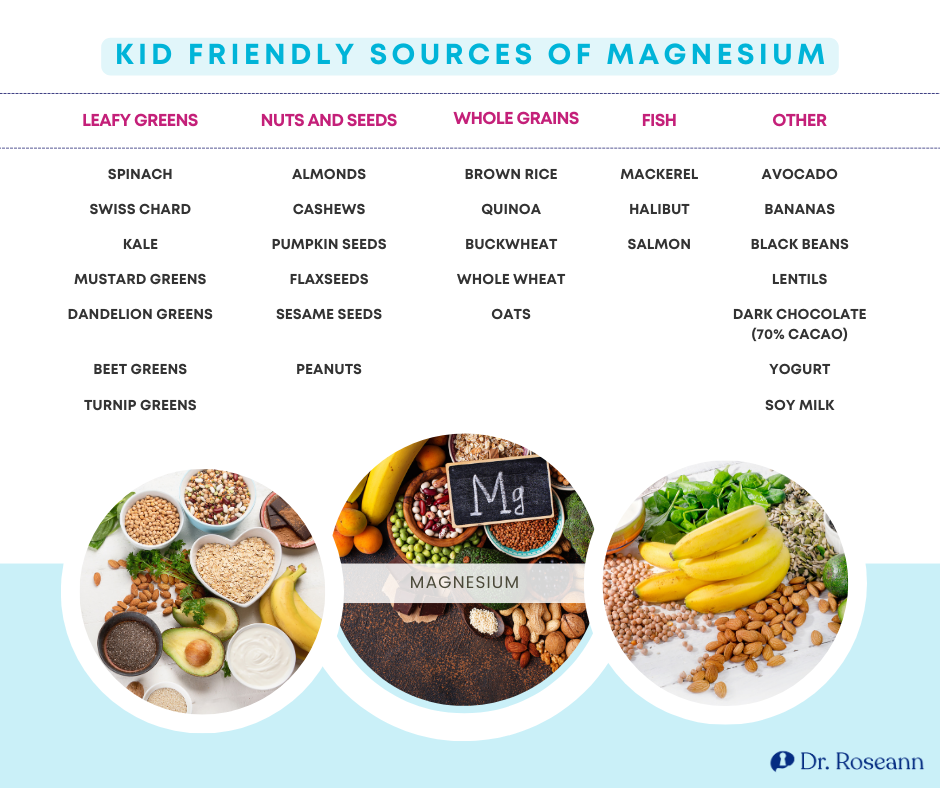
Ensuring your child gets enough magnesium from their diet can sometimes feel like a balancing act. It's not just about magnesium – a varied diet also offers a whole orchestra of nutrients that harmonize to keep your child healthy and vibrant.
But let's be real, the western diet can sometimes fall short on providing enough magnesium-rich foods to fulfill your child's recommended daily intake. And when you add in potential hurdles such as digestive issues, medications, or even high-stress environments, it can feel like a bit of a tightrope walk to keep their magnesium levels topped up.
But fear not, here's a handy list of magnesium-loaded foods along with their approximate magnesium content to help you navigate the mealtime maze:
- A cup of cooked spinach: 157 mg
- A quarter cup of almonds: 97 mg
- Half a cup of cooked black beans: 60 mg
- One medium avocado: 58 mg
- A medium baked potato with skin: 48 mg
- Half a cup of cooked brown rice: 42 mg
- Three ounces of cooked salmon: 26 mg
By weaving a combination of these foods into your child's daily meals, you'll be on track to meeting their magnesium needs. Remember, this list is just a starting point, and the precise magnesium content can vary based on where the food comes from and how it's cooked.
So, here's to making nutrient-rich choices easy and enjoyable for your child!
Chapter 19:
When is Magnesium Supplementation Necessary?
Ideally, a well-rounded diet would fulfill your child's daily magnesium needs. But sometimes, life doesn't follow the script. Stress and health conditions may increase the body's demand for magnesium, requiring more than what the standard diet provides.
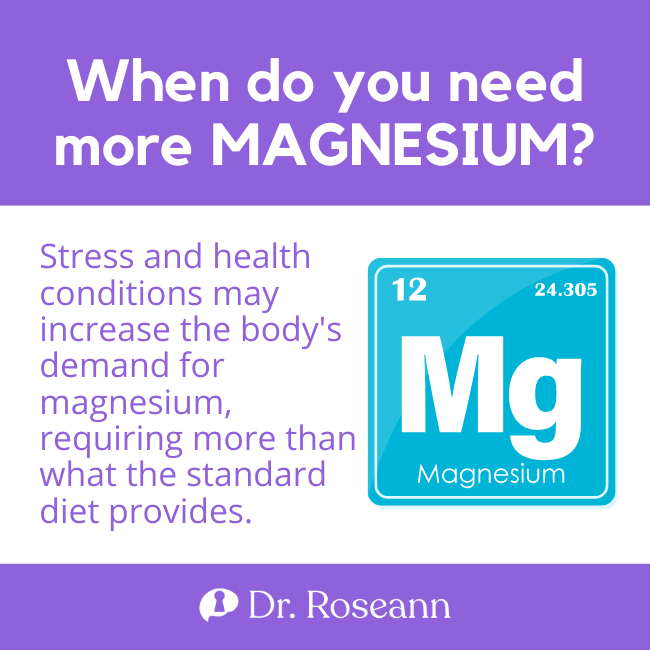
Adults grappling with alcohol dependence, osteoporosis, Crohn's or celiac disease, uncontrolled type 2 diabetes, or simply aging might need to consider magnesium supplements. Similarly, factors like autoimmune disease, chronic infections, insomnia, chronic diarrhea, high blood sugar levels, or aging can cause our bodies to either absorb less magnesium or flush out more than usual.
This applies to children, too. Certain health hurdles, like gastro-intestinal issues, stress, anxiety, OCD, mood issues, PANS/PANDAS, kidney diseases, and diabetes, can play havoc with their magnesium levels. In such cases, a healthcare provider may recommend magnesium supplements.
Kids following a restrictive diet, such as vegetarian or vegan, may also find it tough to get enough magnesium. If they are diagnosed with a magnesium deficiency, they might need supplements until their levels bounce back.
Remember, giving your child magnesium supplements should always be supervised by a healthcare provider, as they can interact with some medications, and too much can be harmful.
Chapter 20:
Sprinkling Magnesium Rich Foods into Your Child's Meals
We've all had those mealtime stand-offs with our picky eaters. But sneaking in magnesium rich foods into their diet doesn't have to be a struggle. Here's how you can make it a fun, delicious adventure:
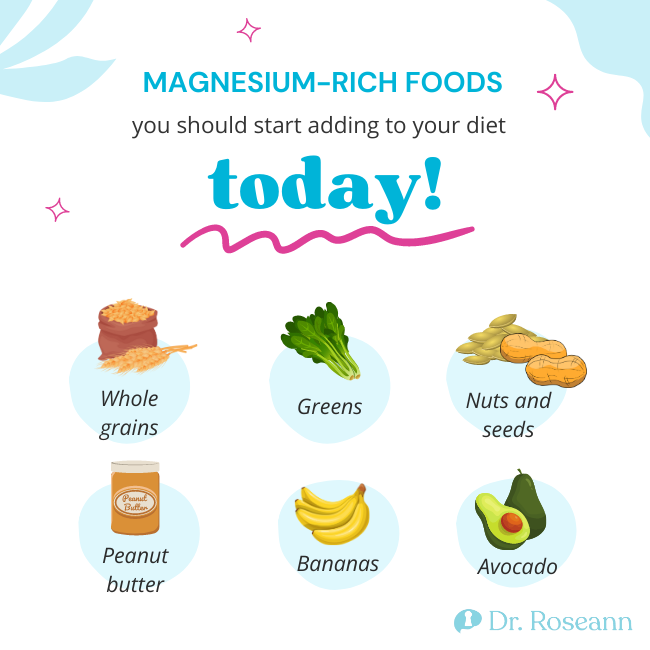
- Whole grains: Jazz up dishes with whole-grain bread, pasta, cereal, and brown rice. A pasta salad or rice with vibrant veggies can make mealtime more exciting.
- Greens: Green leafy vegetables such as spinach and kale are rich in magnesium. Sneak them into smoothies, soups, or sneakily place them in a cheese toastie, and they won't even notice!
- Nuts and seeds: Snacks like almonds, cashews, or pumpkin seeds are a hit with many kids and a fantastic source of magnesium. Try them on their own or sprinkle sunflower seeds on a salad for a crunch.
- Peanut butter: This is a go-to magnesium source that can be served on toast, crackers, or as a dip for celery sticks or apple slices.
- Bananas: Handy and rich in magnesium, bananas can be sliced and paired with peanut butter or yogurt for a well-rounded snack.
- Avocado: This nutrient powerhouse offers magnesium, healthy fats, and fiber. Serve it as guacamole with veggie sticks or spread on toast.
Chapter 21:
The Challenge of Nourishing Kids in a Fast-Food World
Growing kids need a robust diet to fuel their development. But when meals come in the form of processed foods, fast-food takeaways, or sugary snacks, nutritional gaps are inevitable.
If we're not careful, these convenience foods can lead to nutritional deficiencies with long-term health implications. We owe it to our kids to foster healthy eating habits, rich in fresh and whole foods, that will set them on a path for long-term health.
Deficiencies in essential nutrients can result in a range of health issues, from developmental defects to infectious diseases and compromised health in adulthood. A lack of key nutrients in childhood, including magnesium, can set the stage for chronic health concerns like rickets, iron deficiency anemia, obesity, and even coronary heart disease, type 2 diabetes, stroke, cancer, and osteoporosis down the line.
While we want food to be our main source of magnesium, that often isn’t possible with the rise in stress depleting magnesium levels in children. That is where adding magnesium supplements to support muscle and nerve function can be helpful for children. There are various forms of magnesium available, including magnesium citrate, glycinate, malate, oxide, and L-threonate. Each form has its own unique properties and benefits. These magnesium supplements can support muscle and nerve function and the immune system.
Chapter 22:
Exploring Magnesium Supplements for Your Children and Teens
Sometimes, despite our best efforts, it can be tough to meet our kids' daily intake of magnesium through diet alone. In these situations, supplements can step in to fill the nutritional gap. But remember, not all magnesium supplements are the same – each one comes with its unique properties and benefits.
Three primary forms of magnesium supplements can particularly support brain health: Magnesium L-Threonate, Magnesium Malate, and Magnesium Glycinate. These types are especially beneficial for children and teens who are grappling with mental health concerns.
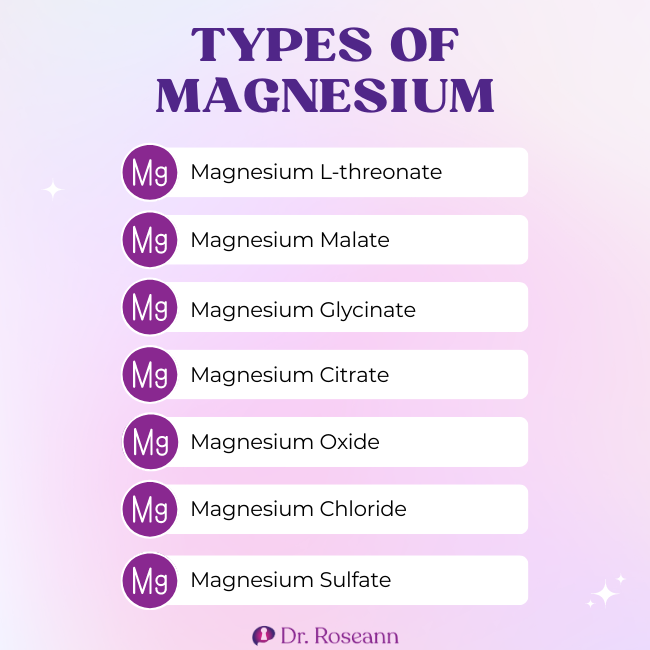
1. Magnesium L-threonate
Magnesium L-threonate stands out among the different types of magnesium due to its high absorbability. It works swiftly in the body, providing the necessary magnesium to tame stress and anxiety. Moreover, it offers respite to our muscles, assisting in relaxation and easing muscle tension.
Beyond these benefits, Magnesium L-threonate has an edge in maintaining brain health. It possesses neuroprotective properties that could potentially lower the risk of conditions like Parkinson's and Alzheimer's, which are linked to age-related cognitive decline. Plus, it has a knack for boosting brain magnesium levels more effectively than other forms, paving the way for an array of cognitive advantages.
Research sheds light on the power of Magnesium L-threonate in enhancing cognitive function and honing learning and memory skills. A particular study revealed that this form of magnesium worked its magic in the hippocampus – the brain's hub for learning and memory – by increasing synaptic density and plasticity (Sun et al., 2016). It can be a powerful supporter of cognitive and attentional processes.
2. Magnesium Malate
Magnesium Malate is a powerful combination of magnesium and malic acid. It serves as a dynamic duo, supporting muscle function, promoting a healthy heart, and fueling energy production. Malic acid, an organic acid, works alongside magnesium to convert food into usable energy.
When magnesium and malic acid join forces, they aid in breaking down carbohydrates, proteins, and fats, transforming them into the energy our bodies need. Magnesium plays a vital role in storing and utilizing this energy for muscle contractions.
In the realm of brain function, Magnesium Malate shines by enhancing neurotransmitter activity. Neurotransmitters are like messengers, facilitating communication among the brain's nerve cells. This form of magnesium also regulates the activity of N-methyl-D-aspartate (NMDA) receptors, which are crucial for learning and memory.
3. Magnesium Glycinate
Magnesium Glycinate is a special combination of magnesium and the amino acid glycine. It comes in forms such as magnesium bisglycinate or magnesium glycinate chelate, where the magnesium is bound to glycine molecules. This unique chemical structure creates a stable complex that enhances the absorption and bioavailability of magnesium in the body.
One notable advantage of Magnesium Glycinate is its improved tolerance and absorption in the intestines. Unlike some other forms of magnesium, it doesn't rely on stomach acid for absorption. Instead, it follows the same pathway as other amino acids, ensuring efficient absorption and utilization by the body.
The enhanced absorption of Magnesium Glycinate means that it can be better tolerated by the digestive system, reducing the likelihood of gastrointestinal discomfort that can occur with other magnesium forms.
This unique formulation of Magnesium Glycinate has several benefits. Its rapid absorption rate makes it particularly useful for promoting restful sleep, alleviating stress, and enhancing mood. Once in the body, it dissociates into its essential ions, including magnesium and glycine. Glycine, acting as a neurotransmitter, plays a role in calming the brain, reducing anxiety, and promoting a state of relaxation.
Overall, Magnesium Glycinate is a well-tolerated and effective form of magnesium that can provide various health benefits, thanks to its enhanced absorption and unique chemical structure.
4. Magnesium Citrate
Magnesium Citrate is a magnesium salt combined with citric acid. It is known for its relatively good absorption rate and is often used as a gentle laxative due to its ability to promote bowel movements. It may also provide some relaxation benefits.
5. Magnesium Oxide
Magnesium Oxide is a form of magnesium combined with oxygen. It has a high magnesium content but is not as well absorbed as other forms. However, it can still be effective for certain applications, such as relieving constipation.
6. Magnesium Chloride
Magnesium Chloride is a form of magnesium combined with chloride. It is highly soluble and can be absorbed efficiently by the body. It is often used in topical applications, such as magnesium oil or sprays, for transdermal absorption.
7. Magnesium Sulfate
Magnesium Sulfate, commonly known as Epsom salt, is a form of magnesium combined with sulfate. It is primarily used in bath salts for its potential muscle relaxation and soothing effects when absorbed through the skin during bathing.
It's important to note that the absorption and bioavailability of these different forms of magnesium can vary. The choice of which form to use may depend on individual needs and preferences, as well as the specific health benefits desired.
Chapter 23:
Magnesium Dosage: How Much Magnesium Should I Take a Day?
Determining the appropriate dosage of medication or supplements for children requires consideration of their age, weight, and health status. The right magnesium supplement dosage for children is typically based on their weight. It means that a larger child will need a higher dose than a smaller child.
It's essential to follow the recommended dosages for children provided by healthcare professionals, as overdosing can be dangerous and even life-threatening. Doctors should also ensure that the medication or supplement provided is appropriate for the child's health and their medical condition, if any.
To serve as reference on how many mg of magnesium per day your child needs, here are the minimum magnesium level requirements for kids and teens:
Infants (0-6 months): 30 mg/day
Infants (7-12 months): 75 mg/day
Children (1-3 years): 80 mg/day
Children (4-8 years): 130 mg/day
Children (9-13 years): 240 mg/day
Males (14-18 years): 410 mg/day
Females (14-18): 360 mg/day
Always check with organizations such as the RDA and Food and Nutrition Board for recommendations about daily allowances for magnesium in children and teens.
Chapter 24:
Is 500mg of Magnesium Too Much?
When it comes to magnesium supplementation, it's essential to find the right dosage for your child. While magnesium offers numerous benefits, it's crucial to strike a balance and avoid excessive intake. The recommended daily dosage for children can vary depending on factors like age and health condition.
A dosage of 500mg of magnesium might be considered high for kids. It's important to note that different forms of magnesium have varying levels of absorption. For instance, magnesium oxide contains a higher magnesium content but is less efficiently absorbed, while magnesium citrate and glycinate have better absorption rates.
To determine the appropriate dosage, it's best to consult with a healthcare professional. They will consider your child's specific needs, health history, and any other supplements or medications they may be taking. With their guidance, you can find the perfect magnesium dosage that aligns with your child's requirements, clinical mental health issue or neurodevelopmental disorder and supports their overall well-being.
Chapter 25:
When to Take Magnesium Supplements

For instance, supplements like Magnesium L-threonate and Glycinate, known for their relaxation properties, are ideal for bedtime. Giving them to your child before sleep helps create a calm and peaceful atmosphere, soothing their muscles and easing restlessness.
On the other hand, supplements like Magnesium Malate can be incorporated into the daytime routine, preferably after breakfast. This can help boost their energy levels, support their growing bodies, and equip them with the vitality needed to tackle the day with enthusiasm.
If the supplement contains a combination of different magnesium types, it may be suitable to administer it before your child heads off to school. Depending on its formulation, it can help manage childhood stress, calm nerves, improve focus, and foster a positive mindset throughout the school day.
Chapter 26:
Can I Take Magnesium with Other Supplements
As parents, we often wonder about the compatibility of different supplements for our children. When it comes to magnesium, the good news is that it generally works well with other supplements, including vitamin D and other brain supplements.
Magnesium and vitamin D are a powerful combination when it comes to supporting overall health and well-being. They work together to promote optimal bone health, enhance immune function, and support brain health. In fact, vitamin D aids in the absorption and utilization of magnesium in the body, making them a beneficial pair (Dean et al., 2017). Considering that many children may be deficient in both magnesium and vitamin D, it's important to ensure they are getting adequate amounts of both.
In addition to vitamin D, magnesium also complements other brain supplements. It plays a crucial role in supporting attention, cognitive function, memory, and mood regulation.
When combined with brain-boosting supplements like omega-3 fatty acids, B vitamins, or herbal extracts, magnesium can enhance their effectiveness and provide additional support for your child's brain health. It can also help support supplements such as inositol for OCD.
While it is generally safe to take magnesium with other supplements, it's important to consider the recommended dosages and potential interactions.
Chapter 27:
How to Get Kids Take Magnesium Supplements
We know that getting kids to take their magnesium supplements can sometimes feel like a challenge. But fear not, because there are strategies you can try to make it a little easier and more enjoyable for everyone involved. Here's what you can do:- Find kid-friendly options: Look for magnesium supplements that are specifically made for children and come in flavors or forms that appeal to their taste buds. Whether it's a tasty gummy or a yummy powder to mix with their favorite drink, finding a supplement they like can make a big difference.
- Get them involved: Take the time to explain to your child why magnesium is important for their health and well-being. Let them be a part of the decision-making process by allowing them to choose the supplement they prefer. Giving them a sense of control and autonomy can increase their willingness to take it.
- Make it a team effort: Turn supplement time into a fun and interactive experience. Create a special routine or ritual around it, like a secret handshake, a special gesture, or a fun song that you do together. This can help make it feel like a special moment that you share, and it adds an element of excitement and positivity.
- Offer praise and rewards: When your child takes their magnesium supplement without resistance, be sure to acknowledge their effort and offer plenty of praise and positive reinforcement. Let them know how proud you are of them for taking care of their health. You can even consider small rewards or incentives to make it even more motivating and rewarding for them.
Chapter 28:
Potential Magnesium Supplement Side Effects
Magnesium is generally safe for children, but it's important to be aware of potential side effects. Taking excessive amounts of magnesium supplements can lead to side effects. Some possible side effects include diarrhea, nausea, and stomach cramps. In rare cases, high doses can cause low blood pressure, irregular heartbeat, and breathing difficulties.
While it's possible to overdose on magnesium from supplements, it's highly unlikely to get too much magnesium from a balanced diet alone. There is no established upper limit for magnesium intake from food sources.
Always follow the recommended dosage on the supplement label or as advised by your doctor. Consult a healthcare provider before introducing any new supplement to your child.
Doctors can provide guidance on the appropriate dosage based on your child's age, weight, and overall health. They can also advise on potential interactions with medications or other supplements.
The most common side effect of magnesium supplements is diarrhea, which can lead to dehydration and nutrient imbalances. Some individuals may experience an upset stomach, nausea, or vomiting.
As magnesium can lower blood pressure, caution is advised for those with low blood pressure when taking magnesium supplements. In rare cases, excessive magnesium intake can result in muscle weakness, difficulty breathing, and other serious side effects.
To minimize the potential side effects of magnesium supplements, it's important to follow the recommended dosage guidelines and choose high-quality supplements. If you or your child experience any symptoms of excessive magnesium intake or have underlying health conditions or are taking medications that may interact with magnesium, consult your healthcare provider for appropriate guidance and advice.
Chapter 29:
Why Magnesium is Important for Mental Health
When it comes to your child's mental well-being, ensuring they receive enough magnesium is crucial. I truly view it as the most important supplement for kid's brains.
Studies have consistently shown that magnesium supplementation can have positive effects on symptoms associated with common mental health conditions such as anxiety, obsessive-compulsive disorder (OCD), mood disorders, and attention-deficit hyperactivity disorder (ADHD).
As parents, we want the best for our children, and considering magnesium as part of their daily regime can offer a range of benefits. Adding magnesium to your child's routine may help improve attention, enhance cognitive processing, promote a balanced mood, and calm the brain.
Magnesium has a calming effect on the brain by regulating neurotransmitters, the chemical messengers that communicate information between nerve cells. It helps to balance the activity of excitatory and inhibitory neurotransmitters, promoting a sense of relaxation and reducing excessive brain activity that can contribute to anxiety or hyperactivity.
Research suggests that magnesium plays a vital role in supporting attention and focus, which are essential for learning and academic performance. It may also enhance cognitive abilities such as memory and information processing, helping your child excel in their studies.
Furthermore, magnesium has been linked to improved mood regulation, promoting a sense of calmness and emotional balance. By incorporating magnesium into your child's daily regime, you may help them better manage stress and reduce symptoms of anxiety or mood swings.
By understanding the importance of magnesium for your child's mental health, including its ability to calm the brain, and considering its inclusion in their daily routine, you can take proactive steps to support their overall well-being and nurture their positive mental wellness.
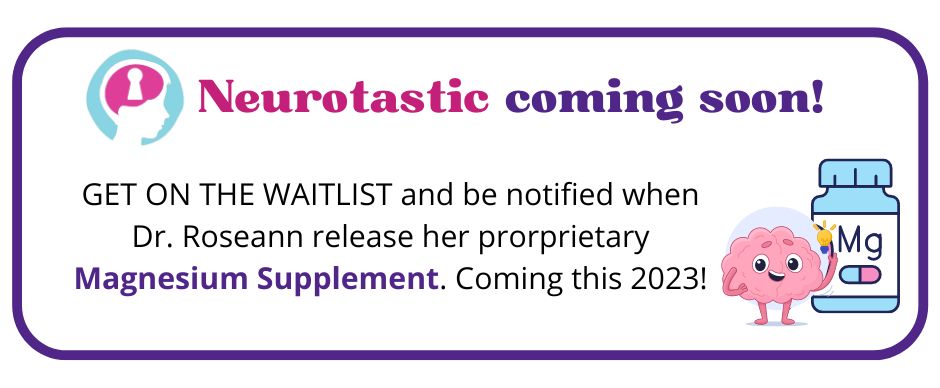

Chapter 30:
TOP Parent Takeaways
✅ Boost your child's mental health with magnesium: Magnesium has been linked to improved symptoms of ADHD, anxiety, and mood disorders in children.
✅ Consider magnesium supplementation for mental health support: Adding magnesium supplements to your child's routine may help promote calmness, relaxation, and improved mood.
✅ Choose the right form of magnesium supplement: Look for well-absorbed forms like magnesium glycinate or magnesium l-threonate to ensure optimal mental health benefits.
✅ Make magnesium supplementation enjoyable for your child: Involve them in the process, let them choose a supplement they prefer, and create a positive and fun routine around taking the supplement.
✅ Prioritize a holistic approach to mental health: Alongside magnesium supplementation, ensure your child receives proper nutrition, exercise, quality sleep, and emotional support for their overall mental well-being.
Citations:
Dean, C. (2017). The Magnesium Miracle (2nd ed.). Ballantine Books.
Garrison, S. R., Allan, G. M., Sekhon, R. K., Musini, V. M., & Khan, K. M. (2012). Magnesium for skeletal muscle cramps. Cochrane Database of Systematic Reviews, 9, CD009402. https://doi.org/10.1002/14651858.CD009402.pub2
National Institutes of Health. (2021, March 29). Magnesium fact sheet for health professionals. https://ods.od.nih.gov/factsheets/Magnesium-HealthProfessional/
Abbasi, B., Kimiagar, M., Sadeghniiat, K., Shirazi, M. M., Hedayati, M., & Rashidkhani, B. (2012). The effect of magnesium supplementation on primary insomnia in elderly: A double-blind placebo-controlled clinical trial. Journal of Research in Medical Sciences, 17(12), 1161–1169. https://www.ncbi.nlm.nih.gov/pmc/articles/PMC3703169/
Boyle, N. B., Lawton, C., & Dye, L. (2017). The effects of magnesium supplementation on subjective anxiety and stress—A systematic review. Nutrients, 9(5), 429. https://doi.org/10.3390/nu9050429
Castiglioni, S., Cazzaniga, A., Albisetti, W., Maier, J. A. M., & Magnesium and Osteoporosis Study Group. (2013). Magnesium and osteoporosis: Current state of knowledge and future research directions. Nutrients, 5(8), 3022–3033. https://doi.org/10.3390/nu5083022
DiNicolantonio, J. J., O’Keefe, J. H., & Wilson, W. (2018). Subclinical magnesium deficiency: a principal driver of cardiovascular disease and a public health crisis. Open Heart, 5(1), e000668. https://doi.org/10.1136/openhrt-2017-000668
Gontijo-Amaral, C. C., Ribeiro, M. A. G. O., & Gontijo, R. C. (2015). Oral magnesium supplementation in asthmatic children: A double-blind randomized placebo-controlled trial. European Journal of Clinical Nutrition, 69(2), 205–210. https://doi.org/10.1038/ejcn.2014.252
Gröber, U., Schmidt, J., & Kisters, K. (2015). Magnesium in prevention and therapy. Nutrients, 7(9), 8199–8226. https://doi.org/10.3390/nu7095388
Guerrero-Romero, F., & Rodríguez-Morán, M. (2011). Complementary therapies for diabetes: The case for chromium, magnesium, and antioxidants. Archives of Medical Research, 42(4), 347–353. https://doi.org/10.1007/s12325-011-0026-7
Kieboom, B. C. T., Niemeijer, M. N., Leening, M. J. G., van den Berg, M. E., Franco, O. H., Deckers, J. W., & Hofman, A. (2018). Serum magnesium and the risk of dementia: The Rotterdam Study. Neurology, 90(15), e1346–e1352. https://doi.org/10.1212/WNL.0000000000005250
Maggio, M., & Ceda, G. P. (2011). Magnesium and endocrine system: Review and update. Magnesium Research, 24(2), 77–83. https://doi.org/10.1684/mrh.2011.0286
Mousain-Bosc, M., Siatka, C., & Bali, J.-P. (2011). Magnesium, hyperactivity and autism in children (R. Vink & M. Nechifor, Eds.). PubMed; University of Adelaide Press. https://www.ncbi.nlm.nih.gov/books/NBK507249/
Pickering, G., Mazur, A., Trousselard, M., Bienkowski, P., Yaltsewa, N., Amessou, M., Noah, L., & Pouteau, E. (2020). Magnesium Status and Stress: The Vicious Circle Concept Revisited. Nutrients, 12(12), 3672. https://doi.org/10.3390/nu12123672
Rosanoff, A., Weaver, C. M., & Rude, R. K. (2012). Suboptimal magnesium status in the United States: Are the health consequences underestimated? Nutrition Reviews, 70(3), 153–164. https://doi.org/10.1111/j.1753-4887.2011.00465.x
Slutsky, I., Abumaria, N., Wu, L.-J., Huang, C., Zhang, L., Li, B., Zhao, X., Govindarajan, A., Zhao, M.-G., Zhuo, M., Tonegawa, S., & Liu, G. (2010). Enhancement of Learning and Memory by Elevating Brain Magnesium. Neuron, 65(2), 165–177. https://doi.org/10.1016/j.neuron.2009.12.026
Sun, Q., Weinger, J. G., Mao, F., & Liu, G. (2016). Regulation of structural and functional synapse density by L-threonate through modulation of intraneuronal magnesium concentration. Neuropharmacology, 108, 426–439. https://doi.org/10.1016/j.neuropharm.2016.05.006
Sun-Edelstein, C., & Mauskop, A. (2009). Role of magnesium in the pathogenesis and treatment of migraine. Expert Review of Neurotherapeutics, 9(3), 369–379. https://doi.org/10.1586/14737175.9.3.369
Tarleton, E. K., Littenberg, B., MacLean, C. D., & Kennedy, A. G. (2017). Role of magnesium supplementation in the treatment of depression: A randomized clinical trial. PLoS ONE, 12(6), e0180067. https://doi.org/10.1371/journal.pone.0180067
Veronese, N., Zurlo, A., Solmi, M., Luchini, C., Trevisan, C., Bano, G., … Maggi, S. (2016). Magnesium status in Alzheimer’s disease: A systematic review. American Journal of Alzheimer's Disease & Other Dementias®, 31(3), 208–213. https://doi.org/10.1177/1533317515621109
Always remember… “Calm Brain, Happy Family™”
Are you looking for SOLUTIONS for your struggling child or teen?
Dr. Roseann and her team are all about solutions, so you are in the right place!
There are 3 ways to work with Dr. Roseann:
You can get her books for parents and professionals, including: It’s Gonna Be OK™: Proven Ways to Improve Your Child’s Mental Health, Teletherapy Toolkit™ and Brain Under Attack: A Resource For Parents and Caregivers of Children With PANS, PANDAS, and Autoimmune Encephalopathy.
If you are a business or organization that needs proactive guidance to support employee mental health or an organization looking for a brand representative, check out Dr. Roseann’s media page and professional speaking page to see how we can work together.
Dr. Roseann is a Children’s Mental Health Expert and Therapist who has been featured in/on hundreds of media outlets including, CBS, NBC, FOX News, PIX11 NYC, The New York Times, The Washington Post,, Business Insider, USA Today, CNET, Marth Stewart, and PARENTS. FORBES called her, “A thought leader in children’s mental health.”

She is the founder and director of The Global Institute of Children’s Mental Health and Dr. Roseann Capanna-Hodge. Dr. Roseann is a Board Certified Neurofeedback (BCN) Practitioner, a Board Member of the Northeast Region Biofeedback Society (NRBS), Certified Integrative Medicine Mental Health Provider (CMHIMP) and an Amen Clinic Certified Brain Health Coach. She is also a member of The International Lyme Disease and Associated Disease Society (ILADS), The American Psychological Association (APA), Anxiety and Depression Association of America (ADAA) National Association of School Psychologists (NASP), International OCD Foundation (IOCDF) International Society for Neurofeedback and Research (ISNR) and The Association of Applied Psychophysiology and Biofeedback (AAPB).
© Roseann-Capanna-Hodge, LLC 2023
Disclaimer: This article is not intended to give health advice and it is recommended to consult with a physician before beginning any new wellness regime. *The effectiveness of diagnosis and treatment vary by patient and condition. Dr. Roseann Capanna-Hodge, LLC does not guarantee certain results.

